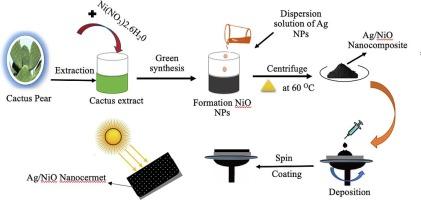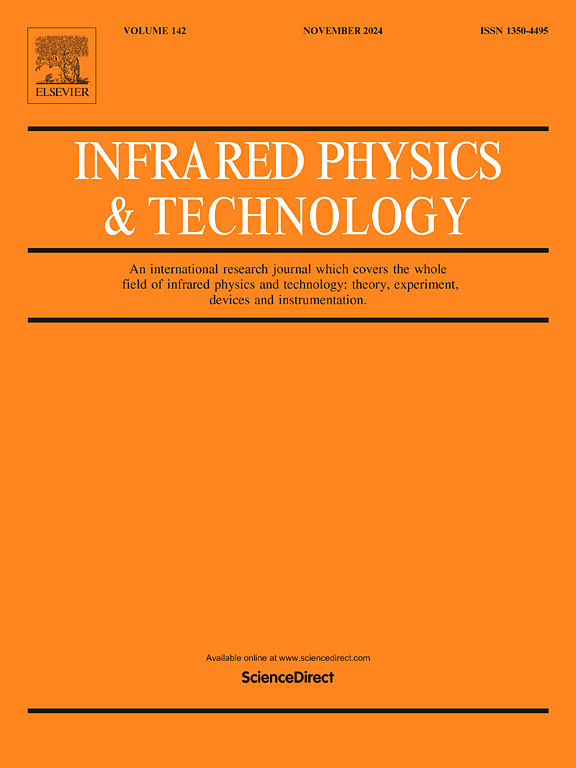Single layered Ag/NiO plasmonic nanocoatings: A new green synthesis method for selective solar absorber
IF 3.1
3区 物理与天体物理
Q2 INSTRUMENTS & INSTRUMENTATION
引用次数: 0
Abstract
This study presents the synthesis of environmentally benign, single-layered spectrally selective Ag/NiO nanocoating absorbers using a green synthesis method. Various characterization techniques, including Rutherford backscattering spectroscopy (RBS), X-ray diffraction (XRD), scanning electron microscopy (SEM), transmission electron microscopy (TEM), and atomic force microscopy (AFM), were used to examine the effects of plasmonic Ag concentration on the structural, chemical composition, and surface morphology of the nanocomposites. The optical properties of the deposited nanocoatings were investigated using a UV–Vis-NIR spectrophotometer in the solar spectrum region (300–2500 nm) and an FT-IR spectrophotometer in the infrared wavelength region (3000–20,000 nm). XRD results confirmed the coexistence of a face-centered cubic phase of Ag and NiO in the Ag/NiO nanocermet thin films. SEM and TEM topography revealed uniformly distributed nanosphere NiO thin films and cubic Ag metal with better dispersibility and crystallization. The RBS spectrum of the samples showed a homogeneous distribution of Ni, Ag, and O atoms throughout the coatings. Ag/NiO nanocoatings deposited with 8 wt% Ag content exhibited excellent solar absorptance (α) = 0.95 and thermal emittance of (ɛ) of 0.08. This enhancement is primarily attributed to the localized surface plasmon resonance (LSPR) effect associated with the embedded Ag nanoparticles, which facilitates more effective utilization of light.

单层 Ag/NiO 等离子纳米涂层:用于选择性太阳能吸收器的新型绿色合成方法
本研究采用绿色合成方法合成了对环境无害的单层光谱选择性 Ag/NiO 纳米涂层吸收器。研究采用了多种表征技术,包括卢瑟福反向散射光谱(RBS)、X 射线衍射(XRD)、扫描电子显微镜(SEM)、透射电子显微镜(TEM)和原子力显微镜(AFM),考察了质子银浓度对纳米复合材料结构、化学成分和表面形态的影响。使用紫外-可见-近红外分光光度计在太阳光谱区(300-2500 nm)和傅立叶变换红外分光光度计在红外波长区(3000-20000 nm)研究了沉积纳米涂层的光学特性。XRD 结果证实,在 Ag/NiO 纳米金属薄膜中,Ag 和 NiO 的面心立方相共存。扫描电子显微镜(SEM)和电子显微镜(TEM)形貌图显示,纳米氧化镍薄膜和立方银金属分布均匀,具有更好的分散性和结晶性。样品的 RBS 光谱显示,Ni、Ag 和 O 原子在整个涂层中均匀分布。Ag/NiO 纳米涂层中的 Ag 含量为 8 wt%,具有出色的太阳能吸收率 (α) = 0.95 和热辐射率 (ɛ) 0.08。这种增强主要归因于与嵌入的银纳米粒子相关的局部表面等离子体共振(LSPR)效应,它有助于更有效地利用光。
本文章由计算机程序翻译,如有差异,请以英文原文为准。
求助全文
约1分钟内获得全文
求助全文
来源期刊
CiteScore
5.70
自引率
12.10%
发文量
400
审稿时长
67 days
期刊介绍:
The Journal covers the entire field of infrared physics and technology: theory, experiment, application, devices and instrumentation. Infrared'' is defined as covering the near, mid and far infrared (terahertz) regions from 0.75um (750nm) to 1mm (300GHz.) Submissions in the 300GHz to 100GHz region may be accepted at the editors discretion if their content is relevant to shorter wavelengths. Submissions must be primarily concerned with and directly relevant to this spectral region.
Its core topics can be summarized as the generation, propagation and detection, of infrared radiation; the associated optics, materials and devices; and its use in all fields of science, industry, engineering and medicine.
Infrared techniques occur in many different fields, notably spectroscopy and interferometry; material characterization and processing; atmospheric physics, astronomy and space research. Scientific aspects include lasers, quantum optics, quantum electronics, image processing and semiconductor physics. Some important applications are medical diagnostics and treatment, industrial inspection and environmental monitoring.

 求助内容:
求助内容: 应助结果提醒方式:
应助结果提醒方式:


